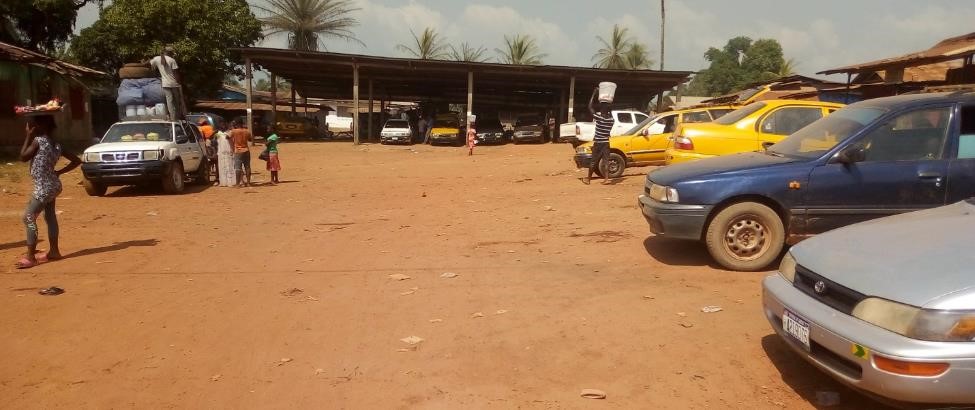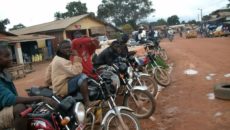BUCHANAN, Grand Bassa – Although the Ministry of Commerce and Industry recently announced a reduction in the prices of gasoline and diesel on the Liberian market with immediate effect, commuters in Grand Bassa are complaining that drivers are still charging the same amount.
On January 7, 2019, Commerce Minister Wilson Tarpeh said the price of gasoline had been reduced from US$3.70 to US$3.30 and the price of diesel had also dropped from US$3.95 to US$3.70 due to decreased oil prices on the world market.
Tarpeh then said that the ministry’s inspectorate department would monitor the new prices of gasoline and diesel fuel on the Liberian market to avoid arbitrary hike in their prices.
In Buchanan, Grand Bassa, the price of gasoline has reduced from LD$600 to LD$520 (US$3.29) and the price of diesel fuel has also reduced from LD$ 680 to LD$600 (US$3.80), but transportation fare from Buchanan to some rural areas remained the same.
Typically, when fuel prices increase or decreases, the government adjusts transportation fare prices to account for the increased or decreased costs to transportation service providers. However, this has not happened this time.
A passenger aboard a shared taxi from Buchanan to Wayzohn City near the Liberian Agricultural Company, Martha Freeman said she was still being charged the same amount as when fuel prices were higher.
Drivers have continued to charge L$600 (US$3.80) from Buchanan to Wayzohn City or Compound Three, she said.
“We don’t know why. When the gas price was up, we used to pay L$600, so now that the government has reduced [the] gasoline price, we expect the transportation fare to drop also, but it is not like that,†she said. “The only way they can sometimes reduce the price is when you beg them. When you beg them, sometimes you pay L$500 (US$3.16), but they will charge you for your load exorbitantly so that they can get the same money from you.â€
Freeman said, because of the high cost of transportation, she cannot bring in most of her produce to Buchanan for trading.
Another passenger, James Peters, said the hike in transportation can only be controlled if the government sends monitors into the various counties to take action against drivers who are still charging passengers excessively.
“If you tell the drivers the truth, they will tell you, ‘Get down from my car, you know plenty.’ So everyone is afraid,†Peters told The Bush Chicken. “We don’t have our own car, but it is not fair to us. I usually travel on this Compound Three road. We used to pay between L$300 to L$350, but it is now L$600.â€
He said the fact that the Liberia Agricultural Company has been maintaining the road to ensure that it is no longer as muddy as it used to be should make transportation prices even lower.
Alexander Tentay, a driver who frequents the Compound Three road, said transportation fare is not only dependent on fuel prices. He said the cost of spare parts and maintenance of the car was also a factor.
“All the spare parts we used to buy before, like the spark plugs, we used to pay L$500 [US$3.16], but we are now paying US$10 for the plugs. The tires we are using now, we are paying US$35 or US$40 for one,†he said. “But gasoline is the easy thing – that is why everyone is complaining about gasoline, but everything that is one this is expensive.â€
Sundaygar Joe, who advises the Genuine Transport Union branch in Grand Bassa, also said transportation fares were more than just dependent on fuel. He said the hike in the U.S. rate and bad road conditions were also factors. (It is noteworthy that the value of the Liberian dollar to the U.S. dollar has largely stabilized since it went into a free fall toward the end of 2017 and leading to the first half of 2018.
Joe said the prices of gasoline and diesel fuel have dropped, but the roads leading to the interior of the country are still bad; therefore the fare will still be high.
He called on the government and corporate entities in the county to recondition those roads if they want to see a reduction of fares.
The road through Big Joe Town to Wayzohn City and River Cess was seriously damaged during the past rainy season and smaller cars could not get through.
The county used over L$700,000 (US$4,430) to buy fuel for trucks provided by the truckers in Buchanan. The Liberia Agricultural Company and other corporate partners also helped in maintaining the road.
Although the dry season has come, some areas along the road are still in deplorable conditions and the situation could worsen if nothing is done to rehabilitate the road.
The cost of transportation is no better on commercial motorcycles, where the price of riding in Buchanan from Monrovia Junction to Tubman Street is L$40 (US$0.25) to L$50 (US$0.32). Before the last increase in fuel prices, the fare was L$30 (US$0.19).
Some motorcyclists told The Bush Chicken that they want to maintain the fares at the current level because they doubt that fuel prices will stay at the current level for long.
There is one bright spot for commuters in the reduction of fuel prices. The transportation fare from Buchanan to Monrovia, a completely paved highway, has dropped from L$600 (US$3.80) to L$500 (US$3.16), with some drivers charging L$450 (US$2.85) outside the parking stations.
Featured photo by Sampson David.



